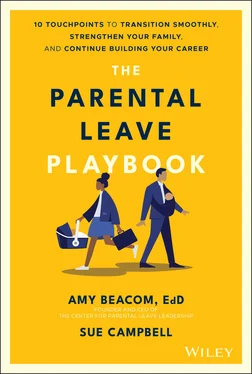Until recently, the prevailing presumptive (impossible) goal was for working mothers to achieve a harmonious balance between their work selves (career-identified role) and their home selves (homemaker and mother-identified role) and not feel torn between two conflicting identities. Today we also realize the way these stereotypes affect fathers. Such presumptions have levied a heavy psychological toll on working parents, often resulting in personal feelings of inadequacy and being overwhelmed. We have not yet developed sufficient social and cultural structures to support new parents in this dual identity at home and work. As a result, new parents (still predominantly moms) are often forced out of traditional careers and into alternative work situations such as the part-time flexibility offered by freelancing or the schedule control possible when becoming an entrepreneur (which even has its own controversial name: mompreneur ). I am seeing a silent wave of fathers facing these identity and role conflicts as well—Kenny is just one example. These solutions may work in the short term, but they can leave families vulnerable to financial strain, job insecurity, and a lack of health insurance. It also sets parents up for challenges down the road if they ever want to reenter traditional work, when they want to collect Social Security, or if they need to use the social service safety net.
Whether you are a mom or a dad, the shock of this transition can be exacerbated by any role and identity confusion you might experience when you become a parent, and again when you go back to work. This can be particularly challenging if you are like many of our clients at the Center for Parental Leave Leadership and the work you do is a big part of your identity—after all, you have already spent a significant portion of your life building your career and the majority of your waking hours working. You may feel like you have your current work life pretty well figured out. You understand your role at work, and you have a home life that is, to some extent, chosen and predictable.
The shift to a working parent identity can bring intense inner turmoil as you try to balance and integrate changing priorities and increased responsibilities at home with those at work.
Societal ideals, personal values, and organizational pressures all contribute to shaping this new reality. Although mothers and fathers may share some similar experiences, they still face very different cultural expectations about their roles at work and at home. Women are particularly vulnerable to pressure to conform to the conflicting roles of ideal worker and good mother. For men, societal expectations about fatherhood tend to center on the ideals of the good provider and the involved father. Additionally, many working parents face the expectation that their return to work should be easy and seamless, which is based on the mistaken assumption that they are the same person they were before going on leave.
Although understanding your own role and identity changes through this transition is crucial, it can also help to think about the people around you and how the roles they play may affect your leave experience and employment (see sidebar Stats: Moms versus Dads ).
How Parenthood Affects Employment
56% of mothers and 50% of fathers say juggling work and family life is difficult. 1
Childcare and family obligations are the top reason keeping women “of prime age” (25–54) from working in formal employment. For men of the same age, the top reason for not working is health limitations, followed by inability to find work. 2
46% of women and 23% of men list childcare or other family obligations as a reason they are not working. 3
Full Time, Part Time, or No Time
76% of people think full-time work is ideal for fathers; only 33% say the same for mothers. 4
96.2% of employed fathers work full time; 78.5% of employed mothers work full time. 5
39% of people who believe one parent should not work full time say the mother should be the one to not work, or to work part time, as compared to 5% who say the stay-at-home (or part-time) parent should be the father. 6
Mompreneurs
80% of mompreneurs started their business after having children, with 69% citing flexibility as the top advantage of having their own business and 71% indicating they are the primary childcare provider. 7
Involved Parenting
80% of women and 74% of men believe that women face a lot of pressure to be an involved parent; 43% of women and 56% of men believe the same of men. 8
When both parents work, moms are more likely to take on more responsibility for sick children (47% moms versus 6% dads) and to be responsible for managing children's schedule and activities (54% moms versus 39% dads). 9
The Value of Our Contributions
Society puts greater value on men's contributions at work (53%) versus home (5%) and conversely greater value on women's contributions at home (28%) versus work (15%). There is a higher expectation that women contribute in both arenas (56%) as compared to men (41%). 10
Parenthood Bias
27% of mothers and 20% of fathers have been treated as if they were not committed to their work. 11
19% of mothers and 14% of fathers have been passed over for an important assignment. 12
19% of mothers and 13% of fathers have been passed over for promotion. 13
Driving the Point Home
Having a baby changes the brain! Pregnancy and the postpartum period are associated with physiological and neurological restructuring changes for moms 14 and dads. 15
In an ideal world, your manager would act as a facilitator and lead communicator during your transition. Because most managers are not specifically trained or equipped to support parental leave, it is likely you will have to lead the conversations and “manage up” to ensure you get the support you'd like. Managers usually see their role as making sure your work gets done by someone in your absence. You can help your manager see that this is a time of opportunity for the whole team to improve communication and develop skill sets by taking on new roles and tasks. Being clear about the kind of support you want is mutually beneficial—everyone will know what to do and you will get what you need to come back strong, productive, and recommitted to your team.
Your Human Resources Representative
Ideally, your HR representative (or HR equivalent) would be helping you understand your organization's policies and practices on parental leave. A good HR representative can be a key partner in building your plan, providing a deeper understanding of how much time you may take off, how much pay you will receive while you are away (if any), and options for returning, such as a part-time or gradual return. Often, trying to make sense of convoluted federal, state, and local laws and company policies can be incredibly confusing. Even your HR department may be unclear. It is their job to aid your understanding, but I want you to be prepared to take the lead in case they don't provide adequate guidance.
Becoming a working parent will also have practical implications. Your morning routines must be reworked and the end of the day will be about bath, bed, and feeding. As wonderful as the arrival of the new child will feel, it will be disorienting to be out of your regular routines and learning new responsibilities. When a new child arrives, a parent is born . Your new child is just beginning to learn about their environment. You, too, are getting to know the world again from a different perspective.
Читать дальше












